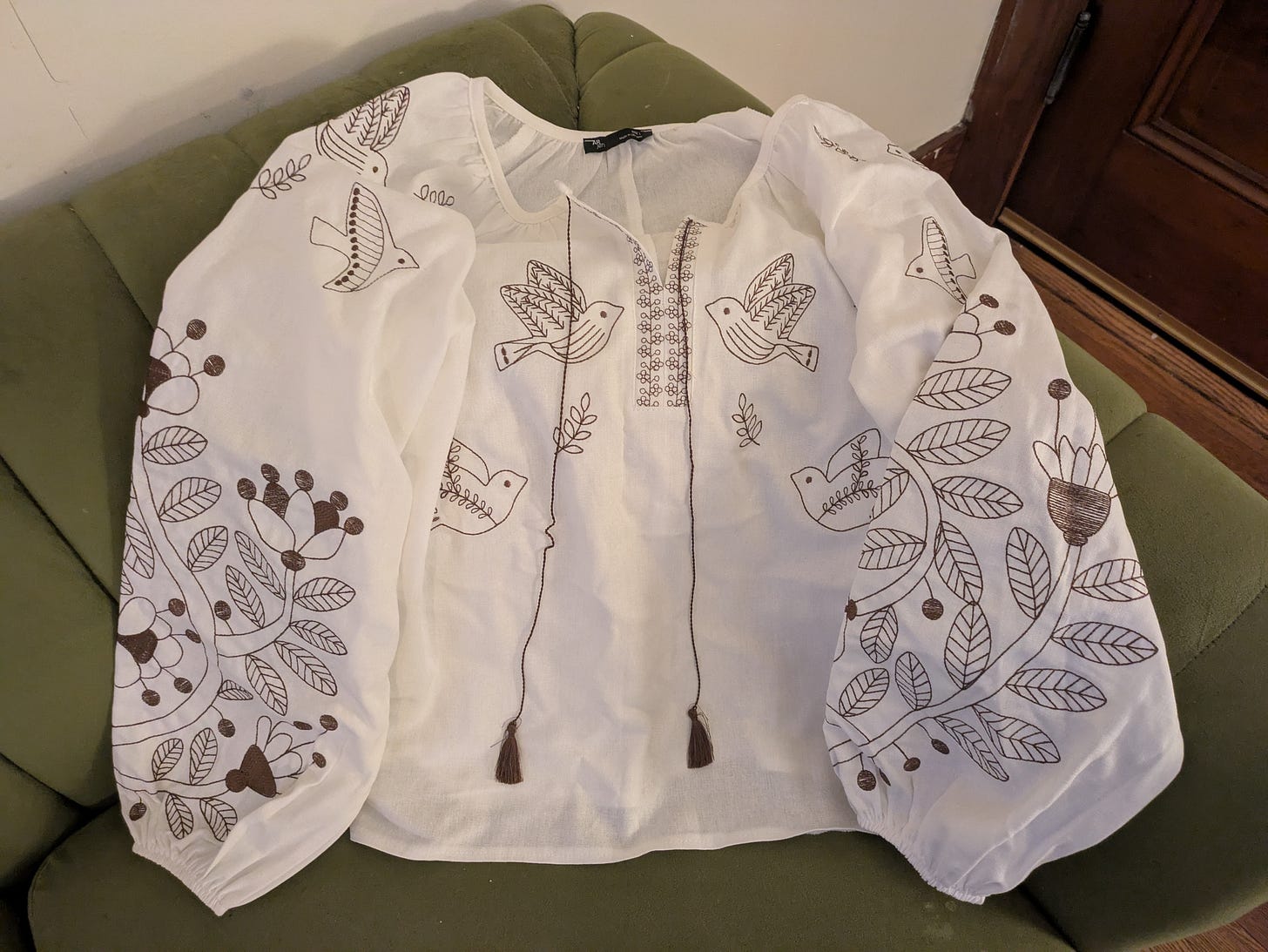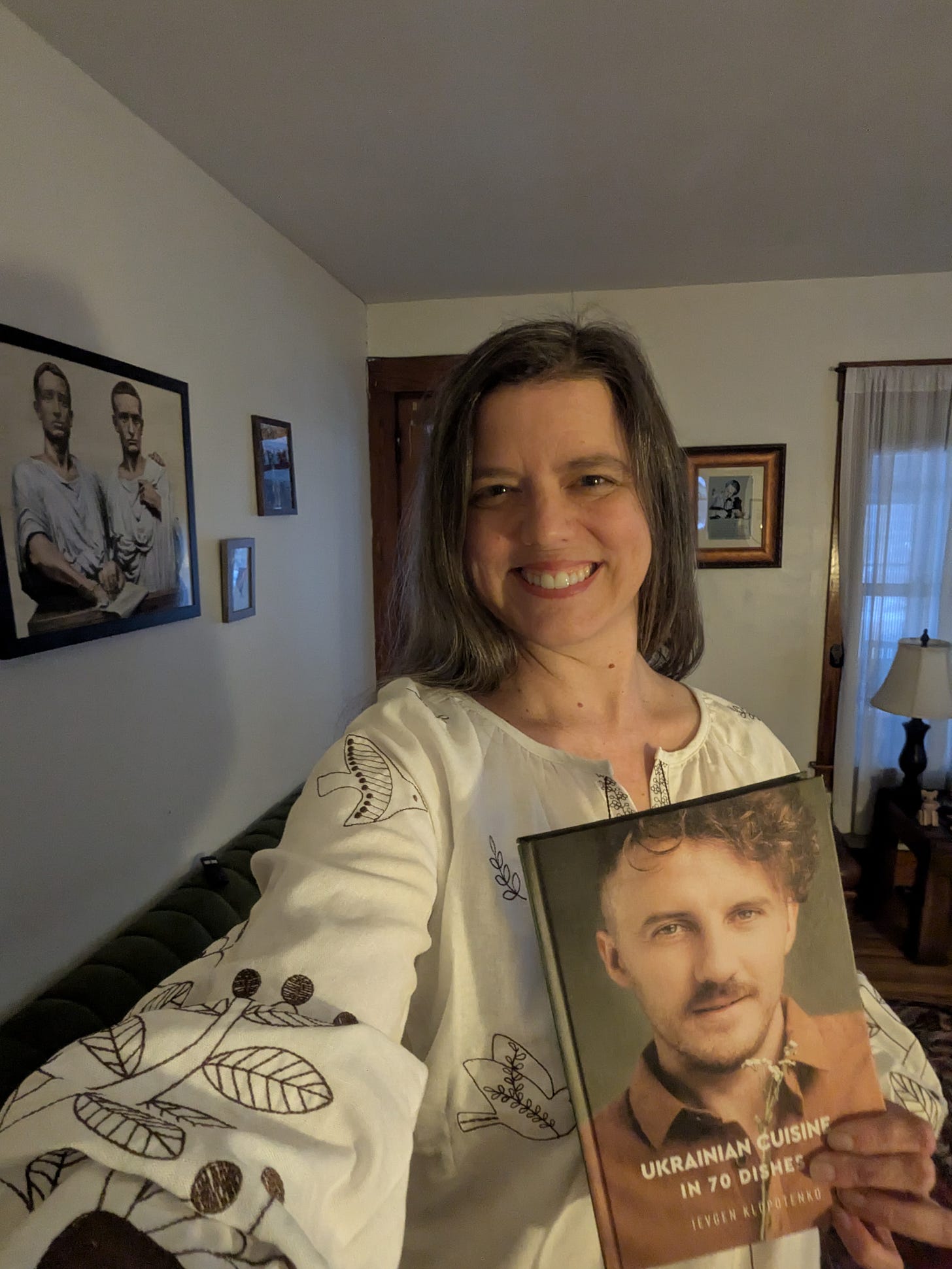Слава Україні! Or, The Power of Language
As I sit down to write this post, I have tears in my eyes. But this time they’re tears of joy. Because after years of wanting one, and unrealistically toying with the idea of taking on the Herculean task of making one, I finally have my own vyshyvanka.
(Vyshyvanka are embroidered tops traditional to both Ukraine and Belarus. Traditional ones have unique patterns and colors for each region. Mine is not done in a particular traditional pattern, but it’s still so beautiful, isn’t it? I particularly love the doves; they remind me of why I went to Ukraine in the first place.)
This shirt was sent to me by a delightful Ukrainian woman I met through ENGin, an organization that pairs up native English speakers with Ukrainians who would like the language practice. I’ve become good friends with both of my assigned speaking buddies over the last couple of years. And then, a few months ago, ENGin added the opportunity to take Ukrainian language lessons from Ukrainian volunteers, and I jumped at the chance.
For a little backstory (and I know my faithful readers all already know this, so feel free to skip this paragraph), I was a Peace Corps volunteer in Ukraine in 2011-2013. For those two years, I lived in the eastern city of Zaporizhzhia and learned basic Russian, which most people of the city spoke at that time. I left just a few months before Putin seized Crimea, which was an early step of the war currently being waged against a country I long ago came to love. Since that time I have not only connected with my two speaking buddies, I also had a chance a year ago to work with a high school English club, also in eastern Ukraine, for a semester over Zoom. All that to say that for several years now, Ukraine has been personally important to me.
But, until the last couple of months, I never learned any Ukrainian. After the seizure of Crimea, the Ukrainians I had known and friended on social media often started posting in Ukrainian a lot more often than the Russian I was used to. I was intrigued by the language that looked similar to Russian in many ways, but had that fancy double dotted i that set it apart (among other things). And I completely understood their desire to defiantly stand against Putin’s attempt to erase their country and culture. As any student of history knows, imperialism depends on destroying not only a nation’s borders and military, but also their culture: their history, arts, cuisine, holidays, and of course, language. It broke my heart to see photos posted by a facebook friend from Mariupol of street signs in her ravaged city being replaced with ones of Russian text because I knew full well what that represented. Erasing language is a key step in eliminating a people. (The US is of course not free from similar acts of cultural violence, from the indigenous tribes being forced to learn English and give up their native tongues, to the quiet removal of all Spanish from government websites last week.)
And so now, I’m learning Ukrainian. Verbs of motion, a myriad of case endings for nouns and adjectives in all three genders, vocabulary I keep getting mixed up with the Russian I still have rattling around in my brain—it’s all a big language adventure and I’m here for it.
(On a fun side note, easily my favorite thing so far is learning the names of the months. Russian month names are cognates with our English ones [or maybe borrowings from English? I’m not sure], so they were easy. The Ukrainian ones bear no connection to that, so they’re more difficult, but each name is symbolic. Before I moved there, I wasn’t sure which language I’d be assigned —Ukrainian has always been widely spoken in the western regions of the country—so I practiced some basic vocabulary and learned what is probably still my favorite word: Листопад. That’s November, but it means “leaf fall” which makes perfect sense. Квітень (April) is based on the word for flowers, Серпень (August) comes from “sickle” because August is the traditional month of the wheat harvest. Our current month is named Лютий and means “furious.” There are different possible interpretations of that, but I like to think it comes from the threat of six weeks yet of the biting cold. [Thanks, Phil.] This page has the list of all twelve if you’re interested in seeing the rest.)
No matter what language I’m studying, I love the process of discovering the vocabulary, the syntax, all the things that add up to the unique beauty each language possesses. But as the war rages on, and as the US no longer has a government friendly to the Ukrainian cause, my language study has taken on a deeper meaning for me. It feels like an act of defiance. There will probably always be some leaders in the world like Putin, cruel and greedy and thoroughly indifferent to the lives they destroy. But no matter how many bombs he sends, no matter how many tanks roll over the border and get stuck in the mud, no matter how much propaganda his state-sponsored media spews out, he cannot get to the heart of Ukraine. Ukraine is the vyshyvanka, delicious borscht, fields of beautiful sunflowers, the poetry of Taras Shevchenko, a national anthem that boldly declares “Ukraine is not dead yet.”
And Ukraine is the Ukrainian language. Слава Україні, something you’ll often hear Ukrainians shout these days, means “glory to Ukraine.” When I join my voice with the Ukrainian chorus calling it out in their native tongue, it means even more to me. It means that despite the efforts of tyrants both now and throughout history, Ukraine lives on. When I first met my students in Ukraine, one young man told me an expression (that I know exists in other languages as well) that however many languages you know, you are that many times a new person. I am unspeakably grateful for the person I get to be because of Ukrainian. To all the people who have helped me get there, from my heart, дуже дякую!
It fits perfectly! And she also sent me this super cool cookbook—another opportunity for me to participate in a vital aspect of the culture.
On a side note, I encourage everyone to seek out opportunities to connect with others in the days ahead. It doesn’t have to be ENGin and Ukrainians, but personal connections are our best way out of what we’re currently dealing with.




Beautiful Vyshyvanka! Before Peace Corps I tried to learn a little Ukrainian and my favorite word was хвилинку which means "just a minute!" It always stuck with me! That's great you're learning Ukrainian!
As we were leaving Ukraine, I remember people chanting Слава Україні
rising up on that super long escalator in Kiev. It made me feel so hopeful.
Слава Україні!
Beautiful ❤️